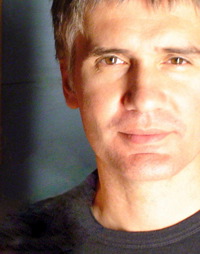 Carlos
Celdrán
Carlos
Celdránargost@cubarte.cult.cu
 Carlos
Celdrán
Carlos
Celdrán
argost@cubarte.cult.cu
Born in Havana, was a graduate of honor from the Higher Institute
of Arts of Cuba.
In 1986, he starts working for Teatro Buendia as a dramaturgy advisor, director
assistant and director.

In 1988, after having
worked in some plays in the company, he directs his first production The
King of the Animals, Colombian anonymous, 1988 Critics’ Award “for
the research on the actors’ work and the strength of visual images”.
This work toured around Cuba, Brazil and Italy with great success. Carlos
Celdrán was invited to participate at the Leeds Arts Festival in England
as an observer.

In 1991, he directs Sappho, based on a short story by Marguerite Yourcenar, 1991 Critics’ Award, which was taken on tours around Cuba and to the Oriente International Theater Festival and Ateneo de Caracas, both in Venezuela. The Cordoba International Theater Festival, Argentina; the UK (the Purcell Room at the South Bank Center in London, Magdalena Project in Cardiff and the Barbican Theater in Plymouth); Don Quixote Festival in Paris and the Ibero-American Theater Festival of Cadiz, Spain.
About this work,
Moreno Uribe from El Mundo, Caracas, Venezuela wrote: “...a production
of the new Cuban Theater that has impacted us and has made us reconsider
the very difficult work of a one-actor show”.
In 1992,
he co-directs The Incredible and Sad Story of Innocent
Erendira and her Heartless Grandmother, by Garcia Marquez, produced
by Fundateneo Festival
to be first opened at the Caracas International Theater Festival, Venezuela,
where it was selected as the most applauded work and where it was given
the best of reviews by the press.
The production was also given the 1992 Critics’ Award in
Cuba, and was selected Number
One by the Critics' Choice of the Time
Out magazine in 1993
in the UK for its season at Riverside Studios in London.
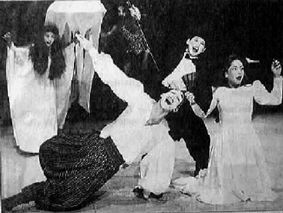
In 1994, it was
selected Number Two (after the Royal Shakespeare Company)
by the Critics’ Choice
of the Time Out magazine for its presentations at the Queen
Elizabeth Hall, South Bank Center in London. It was taken on tours around
different cities
and festivals in the UK such as the Edinburgh Arts Festival, where it was
in the final selection of the best productions in the festival; Mayfest in
Glasgow, Cardiff and Coventry. It was also taken to Don Quixote Festival
in Paris, Galway International Arts Festival in Ireland, and to twelve cities
in the Netherlands. It was presented as well at the International Arts Festival
of Perth, Australia; Singapore International Arts Festival, the Cordoba International
Theater Festival, Argentina; International Arts Festival of San Jose, Costa
Rica; Cali International Arts Festival in Colombia, and a season at La Candelaria
Theater in Bogotá.
About this production, The Independent wrote: “It is a memorable and
frequently beautiful production that transposes the disturbing nature of Marquez’s
tale to stage”.
And The Time newspaper
described it as a "misterious, incredible work, with moving
images".
 In
1995, Carlos Celdrán directs Roberto Zucco by
Bernard-Marie Koltès,
with great success in Havana. About it Granma newspaper wrote: “...this
realistic and, at the same time, metaphoric work does not lose intentions
for the good facture of the piece, not only for the actors’ performances
but also for the environment created by the lights, the sound, the costumes
and stage resources”.
In
1995, Carlos Celdrán directs Roberto Zucco by
Bernard-Marie Koltès,
with great success in Havana. About it Granma newspaper wrote: “...this
realistic and, at the same time, metaphoric work does not lose intentions
for the good facture of the piece, not only for the actors’ performances
but also for the environment created by the lights, the sound, the costumes
and stage resources”.
In 1995 too,
Celdrán is invited to Venezuela to direct Geranio, by Xiomara Moreno
for Teatro Nacional Juvenil de Venezuela, about which a newspaper wrote: “We
have been captivated by the impeccable work directed by Carlos Celdrán...”

In 1996, Carlos
creates his own group, Argos Teatro and directs La
Tríada, a three-actor
version of Oresteia by Aeschylus and The
Flies by Jean Paul Sartre. This
work toured around Cuba, Colombia and Germany.

In 1998,
Carlos Celdrán premiered his production of Baal
by Bertolt Brecht in Havana. About this work, the Spanish theater magazine
Primer Acto said: “...this
is the reflection arising from the passionate and amazing staging of the
members of Argos Teatro. Carlos Celdrán directs them with great skills,
and music, lights and costumes go beyond any expectation. A Brecht seen from
the Caribbean that turns out to be a genuine Brecht”.
This work participated in Mayo Teatral, theater festival organized by Casa
de las Americas, and in the Camagüey Theater Festival, both in Cuba.

In June
1998, Celdrán
is invited to direct The Night of the Assassins by Jose Triana for Centro
Cultural Banco do Brasil in Rio de Janeiro, with Brazilian actors.

In 1999, Carlos Celdrán presented his production of The Good Woman of Szechwan, and received the Caricato Award given by the National Union of Writers and Artists of Cuba, and the Critics’ Award. About this production, Granma newspaper wrote: “Celdrán’s staging of The Good Woman of Szechwan turns out to be a Great Event in the contemporary Cuban scene”. And Juventud Rebelde has said: “During the Summer season of the National Theater, an adaptation of The Good Woman of Szechwan has renewed hopes and has gained its space among the most memorable Cuban works of the decade”.
Granma newspaper
said: “After having seen this work by Carlos
Celdrán,
we could say that if there are some works like this this
year, the applause can be saved in Havana”.
The Good Woman... participated in the International
Theater Festival of Havana.
 In
2000, Carlos Celdrán and Argos Teatro premiered Life
is a Dream by Calderon de la Barca on his 400th anniversary. About this production,
Granma newspaper wrote: “Carlos Celdrán
targets high, the repertoire of his group is becoming symptomatic of
the level and richness
our scene should aim at”. And Juventud Rebelde said: “With
the staging of Life is a Dream, Argos Teatro and particularly its director,
Carlos Celdrán, bring us to one of the greatest myths of our culture
and they do it with clean rightness and simple precision. This visit
of Calderon to Havana will mark the Cuban scene”. Life
is a Dream toured around different Cuban cities and participated
in the Camagüey
Theater Festival.
In
2000, Carlos Celdrán and Argos Teatro premiered Life
is a Dream by Calderon de la Barca on his 400th anniversary. About this production,
Granma newspaper wrote: “Carlos Celdrán
targets high, the repertoire of his group is becoming symptomatic of
the level and richness
our scene should aim at”. And Juventud Rebelde said: “With
the staging of Life is a Dream, Argos Teatro and particularly its director,
Carlos Celdrán, bring us to one of the greatest myths of our culture
and they do it with clean rightness and simple precision. This visit
of Calderon to Havana will mark the Cuban scene”. Life
is a Dream toured around different Cuban cities and participated
in the Camagüey
Theater Festival.
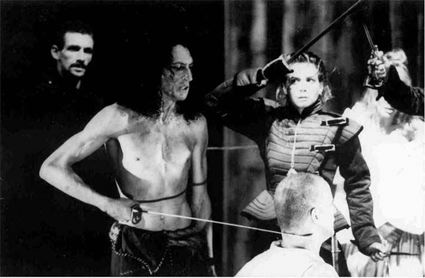
In October
of 2000,
Carlos Celdrán is given the Distinction for the National Culture given
by the Ministry of Culture of Cuba.

In
2001, he directs Miss
Julie by Strindberg. Juventud Rebelde newspaper
has said about it: “Argos Teatro’s Miss Julie
meets its goal of establishing a dialog with the present time
and they
do it with lucidity and witticism, thus creating a work that
is certain and transparent at the same time”. This
work participated in the National Theater Festival of Camagüey,
Cuba, where it received three awards.
In 2001 too,
Carlos Celdrán is invited to the Lincoln
Center Directors Lab organized every year with directors from all
over the United States and from other countries, and he is given a three-month
fellowship
at the Lee Strasberg Theater Institute, both in New York.
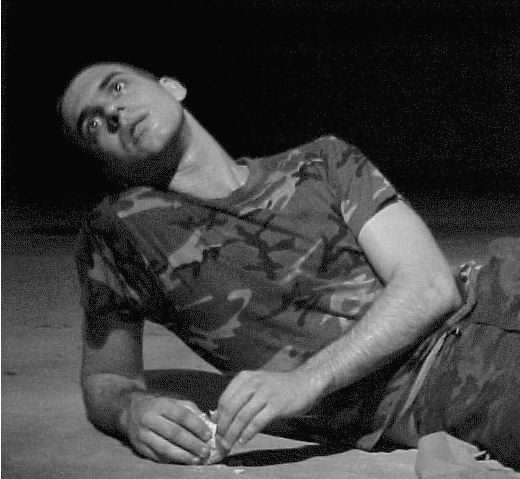
In 2003,
Celdrán
premieres a new version of Roberto
Zucco by Bernard-Marie Koltès,
and received the Caricato Award given by the Performing Arts Association
of the National Union of Writers and Artists of Cuba and the Critic’s
Award. Granma newspaper has said about this work: “This work by Carlos
Celdrán, a fundamental name in our theatrical life in the last decade,
targets high, to the complex, to the rich.”
And Juventud Rebelde newspaper has said: “Just as he did with works
like Baal or The Good Woman of Szechwan, Carlos Celdrán uses parables
and establishes a dialog with our reality by means of no artifices in a work
where each image, each text, give the impression of having been very carefully
studied; however, - or maybe precisely because of this – it traps us
and moves us.”
 In
April 2004, Carlos Celdrán
premieres Life
and Death of Pier Paolo Pasolini by Michel Azama. About
this work Granma newspaper has said: “Celdrán’s
staging impacts for its coherent sobriety. Not very often can we talk in
our theater of such
a precise selection of elements on stage and of such a clean direction of
actors.”
In
April 2004, Carlos Celdrán
premieres Life
and Death of Pier Paolo Pasolini by Michel Azama. About
this work Granma newspaper has said: “Celdrán’s
staging impacts for its coherent sobriety. Not very often can we talk in
our theater of such
a precise selection of elements on stage and of such a clean direction of
actors.”
Juventud Rebelde newspaper has said: “Life and
Death of Pier Paolo Pasolini, not only the play but also the staging, can
be included among the
best works that have come on our stages in a long time.”
In 2006, Carlos
Celdrán premieres Stockman, An Enemy of the People by
Henrik Ibsen. 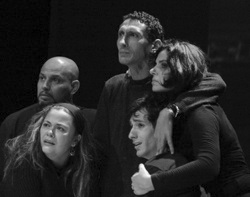 About this work, the critic Amado del Pino has written for the Granma newspaper: "Aplause for this Cuban homage to Ibsen, that has turned into an audience success".
About this work, the critic Amado del Pino has written for the Granma newspaper: "Aplause for this Cuban homage to Ibsen, that has turned into an audience success".
On the other hand, Osvaldo Cano, from Juventud Rebelde newspaper said: "With Stockmann... Carlos Celdrán brings us again a relevant theatrical success. Cristal clear direction skills, a sober and interactive fable and a wisely guided cast, thus placing this work amongst the best of the contemporary Cuban scene."
Stockman received the Critics' Award 2006.
Also in 2006, Carlos Celdrán premieres Chamaco (Kid), by the Cuban playwright Abel González Melo. 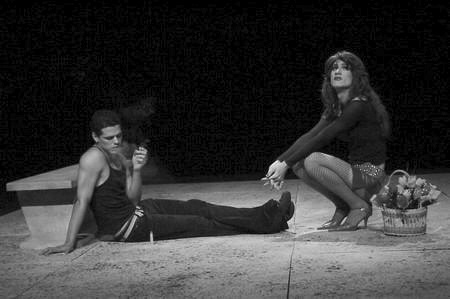
About this work, the critics Amado del Pino and Osvaldo Cano have stated:
"Chamaco has filled up the hot space inhabitted by Argos Teatro. The audience has known how to react with complicity and intelligence to the sincerity, the acuteness and the spontaneity of this work both painful and poetic."
"With the staging of Chamaco, Celdrán continues with his incisive and frank dialogue. This work is full of an intense rhythm, sychronicity and precision, thus bringing us before a mature director who knows what he wants and who has been able to form a demanding and faithful audience."
Chamaco received the Critics' Award this year.
In 2008, he premieres Mud by María Irene Fornés.
About this work, the critic Osvaldo Cano has 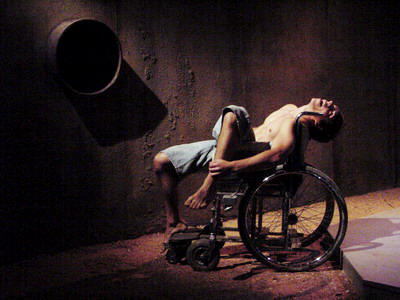 stated: "Como es habitual en las propuestas de Carlos Celdrán, el montaje es austero, llano, conciso. Limpieza, precisión, empleo de un mínimo de elementos con un máximo de utilidad, y la intención expresa de iluminar los puntos de coincidencia entre la ficción y la realidad, son otros de los aspectos que lo distinguen. Cambios de ritmo que dinamizan la puesta y sorprenden a los espectadores, sabiduría a la hora de conducir a los actores por el terreno de la sinceridad; en fin, sobriedad y rigor en tan atinadas dosis que terminan por desembocar en uno de esos espectáculos capaces de zarandearnos debido a su lucidez, constituyen algunos de los acostumbrados argumentos del director, de los que hace uso nuevamente con Fango".
stated: "Como es habitual en las propuestas de Carlos Celdrán, el montaje es austero, llano, conciso. Limpieza, precisión, empleo de un mínimo de elementos con un máximo de utilidad, y la intención expresa de iluminar los puntos de coincidencia entre la ficción y la realidad, son otros de los aspectos que lo distinguen. Cambios de ritmo que dinamizan la puesta y sorprenden a los espectadores, sabiduría a la hora de conducir a los actores por el terreno de la sinceridad; en fin, sobriedad y rigor en tan atinadas dosis que terminan por desembocar en uno de esos espectáculos capaces de zarandearnos debido a su lucidez, constituyen algunos de los acostumbrados argumentos del director, de los que hace uso nuevamente con Fango".
Celdrán ha
impartido talleres de actuación
en el Reino Unido en la London School of Drama, en el Barbican Theatre
de Plymouth, en Australia en
el Perth Institute
of Drama, en
Venezuela en la Universidad
de Trujillo,
en Colombia en la
Corporación
Colombiana de
Teatro, en el
Gran Teatro de
La Habana, Cuba.
Ha impartido
cursos de actuación
y dirección
en el Instituto
Superior de Danza
Alicia Alonso
de la Universidad
Rey Juan Carlos
de
Madrid,
España.
Instituto Universitario
de
Teatro de Venezuela,
en
el Instituto
Superior de
Arte de Cuba,
y en la Escuela
Internacional
de Cine de San
Antonio de los
Baños,
Cuba. En
estos momentos,
es
miembro permanente
del profesorado
del Instituto
Superior
de Arte de
Cuba.
Ha sido miembro
de diversos
jurados para
el Premio
Nacional
de Teatro,
para
el Premio
Virgilio Piñera de dramaturgia, el Festival del
Monólogo
y el Festival
de Camagüey,
entre otros.
Ha incursionado
en el cine con
varios
guiones realizados
por el Instituto
Cubano de Arte
e Industria Cinematográficos
(ICAIC). También
ha trabajado
en la dramaturgia
de otros
guiones
para diferentes
directores.
In November, 2008 he presents Abalon, One Nite in Bangkok, by the German playwright Fritz Kater.
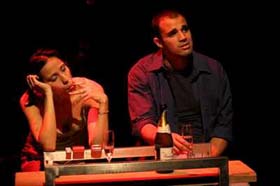
Amado del Pino, has stated in the Granma newspaper: "Carlos Celdrán salva esa vocación imprecisa y generalizadora del original con una puesta en escena sobria en apariencia pero de una rotunda brillantez en las soluciones escénicas. La capacidad para sostener un ritmo a la vez ágil y metafórico que hemos visto crecer en otros de sus espectáculos alcanza aquí un grado de serena maestría."
In 2009 he premieres Endgame, by Samuel Beckett.
En el 2007 fue miembro del jurado de Teatro del Premio Casa de las Américas.
En el 2002, fue miembro del Jurado del 24 Festival del Nuevo Cine Latinoamericano de la Habana.
Ha publicado artículos y ensayos teatrales en diversas revistas especializadas de Cuba y otros países.
En el 2006 la editorial Tablas-Alarcos publica su libro La Escena Transparente.
Carlos Celdrán recieved the Grand Prix at the National Theater Festival of Camagüey.
Some of the actors in the show, also received awards for their work. see awards list (Spanish)
This work also received the Caricato Award, as well as the Critic’s Award, given with a special character for the first time this year.
Celdrán has given workshops in numerous institutions in Cuba, and in the UK at the London School of Drama, in Plymouth at the Barbican Theater; in Australia at the Perth Institute of Drama; at University of Trujillo, Venezuela; at Corporacion Colombiana de Teatro in Bogotá, Colombia. He has taught acting and directing at Instituto Superior de Teatro de Venezuela, and at the moment he is part of the faculty of the Higher Institute of Arts of Cuba.
Celdrán has been part of different juries for: the Havana Film Festival,
Camagüey Theater Festival, Cuba; for Revista Tablas Critic’s Award,
for the Festival of Monologues and the National Theater Award.
Carlos Celdrán has also worked in various screenplays for the Cuban
Institute of Cinematographic Art and Industry (ICAIC).
In 2002, Carlos Celdrán was part of the jury of the 24 Havana Film Festival.
He has published articles and essays in different magazines in Cuba and other countries.
articles written by Carlos Celdrán (in Spanish)
Mis encuentros con Roberto Blanco